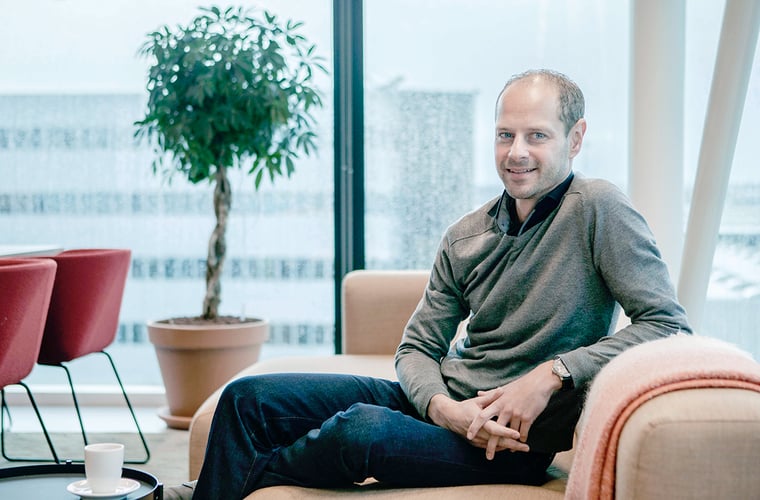At this point, we’re all painfully aware of the impact that COVID-19 is having on the global economy.
Eurozone GDP contracted by 3.8% in Q1 of 2020, a more significant drop than that of the 2008 financial crisis. And in the past 7 weeks, 33.5 million Americans have filed jobless claims, bringing the nation’s unemployment rate to 24.9%, similar figures to those at the peak of the Great Depression.
Despite all this, analysts agree that our collective economies will eventually return to post-COVID stability - in one way or another - once a vaccine is developed.
So with that in mind, we sat down with Talmundo CEO and veteran of the HR onboarding industry, Sander Stevens, to talk about the future of onboarding after COVID-19.
 Sander Stevens, Talmundo HQ, Amsterdam | Photo by Dik Nicolai diknicolai.com
Sander Stevens, Talmundo HQ, Amsterdam | Photo by Dik Nicolai diknicolai.com
 |
To start, can you tell us a little bit about the state of employee onboarding before COVID-19? |
"Well, first of all, onboarding is not something new. Every company does it in one form or another. But over the last couple of years, companies have become more aware of the importance of onboarding, and the positive business impact it can have if done right.
Instead of just a space on the intranet where everyone can drop whatever they think might be relevant for a new hire, we see organizations start to really think about what is important and care about the engagement of onboardees. They’ve introduced formal processes and structure, increased focus on learning and development, and created exciting experiences."
 |
And what were the big trends in onboarding before all of this? |
"The big trend we’ve all seen is that onboarding no longer starts on the first day. It now begins when an employee accepts a job offer and has expanded to include the preboarding phase before an employee arrives at the office.
To make this happen, an increasing number of companies have turned to digital onboarding solution providers to help support and structure their onboarding process."
 |
What do you think are the main challenges businesses are likely to face with post-pandemic onboarding?
|
"The challenge at hand that businesses are facing is what we call Reboarding - the process of bringing your teams back-on-board after an extended absence. After months of working from home, many countries are nearing a time where people can start to go back to the office.
But this will still be far from “normal”.
New rules will apply, from distancing measures and stringent cleaning policies to rotational working. People in your organization might have lost loved ones or have been sick themselves. And people will have genuine fears for their safety and security. These will be big challenges for most businesses.
On top of that, some employees will continue to work remotely for at least a while, and remote work will likely become more common even for the businesses who never considered it before COVID-19.
All of this will impact the way we need to think about onboarding."
 |
How does remote onboarding differ from a standard onboarding experience? |
"With remote work you miss out on all those little social interactions and new hires can start to feel lost. Keeping a pulse, communicating, and connecting is more important than ever in a remote onboarding setting.
Our customers, who are already using a digital platform for onboarding, were able to easily adapt their existing journeys for a remote setting. They started immediately by creating extra COVID specific content, increasing new hire check-ins with added pulse checks and surveys, and introduced remote buddy systems."
 |
Do you think remote onboarding will continue to have a role to play in the future? |
"Usually, you never know what will happen in the future, but in this case, I dare to say that remote work will jump up. Organizations and employees have now experienced remote work and they’ve seen that business continues, even if they’re not all together at the office.
As I said, companies adapted fast and changed their policies and infrastructure to be able to work from home. So with this in mind, remote onboarding will certainly continue to play a role in the future."

Sander Stevens, Talmundo HQ, Amsterdam | Photo by Dik Nicolai diknicolai.com
 |
Why do you think digital onboarding is so important? |
"For companies already working with communication channels like Slack or Teams, with digital infrastructure in the cloud or accessible through VPN, the ability to move instantly to remote working was relatively easy. The same goes for companies who already digitized their onboarding process. They were able to adapt quickly to the situation and continue communication with their new hires.
Without that digital framework, the transition would have been incredibly difficult and probably quite expensive.
In the last couple of weeks, we’ve seen a big increase in traffic to our website’s educational resource center and an uptick in organizations that are interested in seeing what a modern onboarding solution looks like first-hand.
So it seems that companies who don’t currently have a digital onboarding program in place are exploring for when they start onboarding again post COVID-19."
 |
Do you think onboarding is still important for businesses in the face of such dramatic economic turndown? |
"Yes, I do. In the current climate, I think it’s more important than ever to get onboarding right."
 |
When you say ‘get onboarding right’, what do you mean? |
"Nearly 90% of new joiners decide whether to stay or go within the first six months and as we all know recruitment can be very costly. A good onboarding experience can make a big impact on new hires and can be the difference between retaining your latest & greatest team member, and starting the whole recruiting process over again.
A good onboarding program not only improves the retention rate, it also shortens time to productivity. Good onboarding lets your new hires know what is expected of them, provides centralized access to essential systems and support, and helps them get the information they need, when they need it.
Most importantly though, a good onboarding program drives engagement. Transparent processes, strong communication, and dynamic storytelling ensure employees feel more engaged with the organization from the start. Engaged employees are very important for any organization as they work harder, contribute more, and are generally happier!"
 |
Have you seen any onboarding innovations or success stories as a result of the lock-down? |
"Well, I think it’s amazing how quickly our partners have managed to adapt to the remote working situation, and the impact COVID-19 is having on their business. Of course, for so many organizations the ramifications have been overwhelmingly negative, especially from a commercial point of view, but you also see a lot of creativity and adaptability.
Some of our partners are experiencing huge work pressure due to the rapid increase in demand for essential services & online purchasing.
One example is Lidl, who have been onboarding thousands of new employees in a very short time frame. This “mass onboarding” called for a more streamlined onboarding process. Because Lidl already had a digital onboarding process in place they were able to adjust this rapidly to their changing needs, rules, and timelines, and still provide a structured onboarding process for each new hire."
 |
What about for office-based organizations? |
"JTI comes to mind. They’ve developed an amazing remote onboarding strategy that has allowed them to continue to bring on much needed new staff for their newly established Global Business Services center in Warsaw. For their efforts, they've received some great feedback from their recruits, it’s all over LinkedIn."
 |
The Takeaway |
Onboarding is here to stay, and is perhaps more important than ever.
Taking learnings from COVID-19 to strengthen our existing onboarding programs we can future-proof them for the unknowable challenges of tomorrow.
And what better time to start than right now!
Want to know how you can reinvent your onboarding programme for a post-COVID future? Try our free onboarding webinar on demand!


 Sander Stevens,
Sander Stevens,


